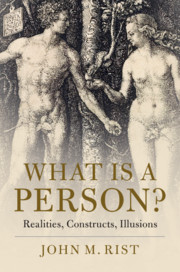Book contents
- What is a Person?
- What is a Person?
- Copyright page
- Contents
- Acknowledgments
- Introduction
- Part I Constructing the ‘Mainline Tradition’
- Part II No God, no Soul: What Person?
- Part III Toward Disabling the Person
- 15 Introducing the Five Ways
- 16 Assimilation and Homogenization
- 17 The Way of Prometheus
- 18 Whistling in the Humanitarian Wind
- 19 Virtual Morality: Propaganda as Social Glue
- 20 The Way to an Absolute Nihilism
- Part IV Persons Restored or Final Solution?
- Epilogue or Epitaph?
- Appendix The World of Rights Transformed Again
- Bibliography
- Index
20 - The Way to an Absolute Nihilism
from Part III - Toward Disabling the Person
Published online by Cambridge University Press: 05 December 2019
- What is a Person?
- What is a Person?
- Copyright page
- Contents
- Acknowledgments
- Introduction
- Part I Constructing the ‘Mainline Tradition’
- Part II No God, no Soul: What Person?
- Part III Toward Disabling the Person
- 15 Introducing the Five Ways
- 16 Assimilation and Homogenization
- 17 The Way of Prometheus
- 18 Whistling in the Humanitarian Wind
- 19 Virtual Morality: Propaganda as Social Glue
- 20 The Way to an Absolute Nihilism
- Part IV Persons Restored or Final Solution?
- Epilogue or Epitaph?
- Appendix The World of Rights Transformed Again
- Bibliography
- Index
Summary
Virtual morality might be re-described – if hyperbolically – as a deceptive guise of moral nihilism: a recourse to what is deemed to be in the interest of safety or survival at the expense of truth. In its various mutations it is more widespread than the previous discussion has perhaps suggested, as an article by Richard Robinson, written some eighty years ago, confirms. In ‘The emotive theory of ethics’, Robinson (1948) claims that no moral judgments are true, yet he does not reject morality, being in this not unlike those Feuerbachian clergymen who deny the existence of God but claim not to be atheists. Such perversities should, of course, be distinguished from the opinions of moral-sense theorists such as Hutcheson and Hume whose claim that we possess a moral sense is intended as empirical, pointing to objective fact about human nature. That may be mistaken but does not involve deception, hence cannot be denoted a dishonest nihilism.
- Type
- Chapter
- Information
- What is a Person?Realities, Constructs, Illusions, pp. 193 - 200Publisher: Cambridge University PressPrint publication year: 2019



